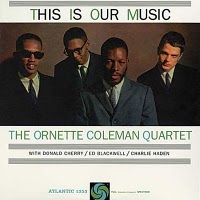 It was over 30 years ago that I bought my first Ornette Coleman album, Free Jazz, from the second-hand record shop: it was love at first sight (first hear?). Love is inexplicable, at least to those in love, but the sound of Coleman’s alto had an immediate effect on me, an emotional connection, that continues until today. It is the early Atlantic recordings that remain at the heart of my love for Coleman. I have only been listening to This Is Our Music for the past couple of months (I feel no need to rush a love affair), but, other than Free jazz, it has become my favorite of the Coleman-Atlantic albums (but I don’t feel I have to be bound by that judgement in the future). I have heard it said that compared to other figures of the 1960s jazz avant garde Coleman now seems very tame: I think that is true, at least as far as he doesn’t howl and shout in way that threatened to blow away all our assumptions of what music should be, but then the other avant garde sax players tended to fall in behind Coltrane, in their stance of difference they tended to sound the same, while Coleman remains unique. He has created his own musical world, one I find as vivid and friendly as an Impressionist painting, and it is a world that has no successful copies. The one musician who shared this vision was Don Cherry and he is the Engels to Coleman’s Marx, the Watson to his Holmes, the Robin to his Batman – he is the lesser figure, the one who takes his imaginative world from his dominating companion, but maybe he brings Coleman closer, creating a bridge between him and us. Charlie Haden is the anchor for this music, for most of this album playing an idiosyncratic hard bop bass, it has the lines that stabilize the music. The exception is Beauty Is a Strange Thing where, playing with a bow, he allows the music to drift away like a cloud without any edges. Ed Blackwell is a unique drummer (and I much prefer him to Billy Higgins’ work on the earlier Atlantic-Coleman albums) – he is the gentlest of drummers, not giving the music the rhythmic propulsion we expect a drummer to provide, but rather a rhythmic voice responding to and answering the horns. Writing about other Coleman-Atlantic albums I have said that their great limitation is that all the tracks tend to be a bit the same – here there are two numbers that stand out for their difference: the slow and hovering Beauty Is a Rare Thing and the reinvention of Embraceable You. The latter is the only Ornette Coleman version of a standard I know – it is as though Gershwin’s melody has been replanted in a totally alien soil and it has grown in an unforeseeable way, still recognisably having the same shape, but also disturbingly different. –Nick
It was over 30 years ago that I bought my first Ornette Coleman album, Free Jazz, from the second-hand record shop: it was love at first sight (first hear?). Love is inexplicable, at least to those in love, but the sound of Coleman’s alto had an immediate effect on me, an emotional connection, that continues until today. It is the early Atlantic recordings that remain at the heart of my love for Coleman. I have only been listening to This Is Our Music for the past couple of months (I feel no need to rush a love affair), but, other than Free jazz, it has become my favorite of the Coleman-Atlantic albums (but I don’t feel I have to be bound by that judgement in the future). I have heard it said that compared to other figures of the 1960s jazz avant garde Coleman now seems very tame: I think that is true, at least as far as he doesn’t howl and shout in way that threatened to blow away all our assumptions of what music should be, but then the other avant garde sax players tended to fall in behind Coltrane, in their stance of difference they tended to sound the same, while Coleman remains unique. He has created his own musical world, one I find as vivid and friendly as an Impressionist painting, and it is a world that has no successful copies. The one musician who shared this vision was Don Cherry and he is the Engels to Coleman’s Marx, the Watson to his Holmes, the Robin to his Batman – he is the lesser figure, the one who takes his imaginative world from his dominating companion, but maybe he brings Coleman closer, creating a bridge between him and us. Charlie Haden is the anchor for this music, for most of this album playing an idiosyncratic hard bop bass, it has the lines that stabilize the music. The exception is Beauty Is a Strange Thing where, playing with a bow, he allows the music to drift away like a cloud without any edges. Ed Blackwell is a unique drummer (and I much prefer him to Billy Higgins’ work on the earlier Atlantic-Coleman albums) – he is the gentlest of drummers, not giving the music the rhythmic propulsion we expect a drummer to provide, but rather a rhythmic voice responding to and answering the horns. Writing about other Coleman-Atlantic albums I have said that their great limitation is that all the tracks tend to be a bit the same – here there are two numbers that stand out for their difference: the slow and hovering Beauty Is a Rare Thing and the reinvention of Embraceable You. The latter is the only Ornette Coleman version of a standard I know – it is as though Gershwin’s melody has been replanted in a totally alien soil and it has grown in an unforeseeable way, still recognisably having the same shape, but also disturbingly different. –Nick


